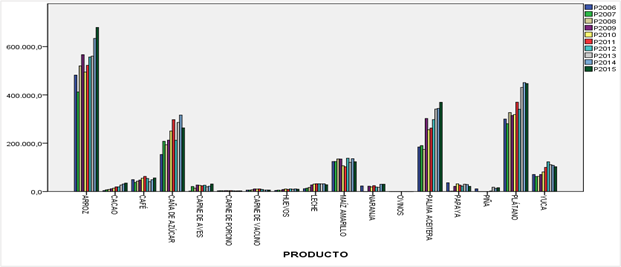San Martín Region: Trilogy (AAE) of Water, Agriculture, Energy, and Economic Growth
DOI:
https://doi.org/10.51252/race.v4i2.815Keywords:
energy expenditure, water management, water footprint, agricultural productivity, water resourcesAbstract
Water resources are a problem in the San Martín region, reaffirming the purpose of directing actions towards an integrated management, with a territorial approach to respond to climate change. The objective was to demonstrate that the trilogy (AAE) water, agriculture and energy through econometric calculation is related to economic growth. Type of basic research, under the non-experimental-correlational research design. The water footprint was used to indicate the availability of water resources, allowing changing opinions regarding water scarcity linked to food and energy security in the region. A multiple linear econometric model was established to compare the relationship between the availability of water resources, agricultural productivity, energy supply and economic growth in the San Martín region, applying the ordinary least squares method. The regression shows that there is a coefficient of determination equal to 97.09%, showing that economic growth is explained by the availability of water resources, agricultural productivity and energy supply, and there is also a strong relationship between these variables since a correlation coefficient of 0.98532 is determined between economic growth and the other variables.
Downloads
References
Al Kez, D., Foley, A., Lowans, C., & Del Rio, D. F. (2024). Energy poverty assessment: Indicators and implications for developing and developed countries. Energy Conversion and Management, 307, 118324. https://doi.org/10.1016/j.enconman.2024.118324
Autoridad Nacional del Agua. (2015). Huella hídrica del Perú. Sector agropecuario.
Baylon Salvador, E. G., & Quispe Cusi, Y. (2023). Agricultura familiar y el desarrollo sostenible como medios de garantía para mantener la seguridad alimentaria. Revista Alfa, 7(20). https://doi.org/10.33996/revistaalfa.v7i20.225
Benavente Cárdenas, C., Camargo Salcedo, P., Sarmiento Sarmiento, G., & Mena Chacón, L. (2018). Evaluación del desarrollo de la agricultura periurbana y propuesta de gestión integral en el distrito de Cayma, Arequipa, Perú. Idesia (Arica), ahead, 0–0. https://doi.org/10.4067/S0718-34292018005001101
Berchoux, T., Watmough, G. R., Hutton, C. W., & Atkinson, P. M. (2019). Agricultural shocks and drivers of livelihood precariousness across Indian rural communities. Landscape and Urban Planning, 189, 307–319. https://doi.org/10.1016/j.landurbplan.2019.04.014
Deshmukh, M. K. G., Sameeroddin, M., Abdul, D., & Abdul Sattar, M. (2023). Renewable energy in the 21st century: A review. Materials Today: Proceedings, 80, 1756–1759. https://doi.org/10.1016/j.matpr.2021.05.501
Hamidov, A., & Helming, K. (2020). Sustainability Considerations in Water–Energy–Food Nexus Research in Irrigated Agriculture. Sustainability, 12(15), 6274. https://doi.org/10.3390/su12156274
Hernández Sampieri, R., Fernández Collado, C., & Baptista Lucio, P. (2014). Metodología de la investigación (McGraw-Hill Education (ed.); Sexta Edic).
Ijoma, G. N., Mutungwazi, A., Mannie, T., Nurmahomed, W., Matambo, T. S., & Hildebrandt, D. (2022). Addressing the water-energy nexus: A focus on the barriers and potentials of harnessing wastewater treatment processes for biogas production in Sub Saharan Africa. Heliyon, 8(5), e09385. https://doi.org/10.1016/j.heliyon.2022.e09385
Jansen, A., Wang, R., Behrens, P., & Hoekstra, R. (2024). Beyond GDP: a review and conceptual framework for measuring sustainable and inclusive wellbeing. The Lancet Planetary Health, 8(9), e695–e705. https://doi.org/10.1016/S2542-5196(24)00147-5
Kapur, R. (2019). Employment Opportunities in Rural Areas. Acta Scientific Agriculture, 3(8), 58–65. https://doi.org/10.31080/ASAG.2019.03.0564
Koop, S. H. A., Grison, C., Eisenreich, S. J., Hofman, J., & van Leeuwen, K. (2022). Integrated water resources management in cities in the world: Global solutions. Sustainable Cities and Society, 86, 104137. https://doi.org/10.1016/j.scs.2022.104137
Lalawmpuii, & Rai, P. K. (2023). Role of water-energy-food nexus in environmental management and climate action. Energy Nexus, 11, 100230. https://doi.org/10.1016/j.nexus.2023.100230
Nguyen, T. P. L., Virdis, S. G. P., & Vu, T. B. (2023). “Matter of climate change” or “Matter of rapid urbanization”? Young people’s concerns for the present and future urban water resources in Ho Chi Minh City metropolitan area, Vietnam. Applied Geography, 153, 102906. https://doi.org/10.1016/j.apgeog.2023.102906
Nhamo, L., Mpandeli, S., Liphadzi, S., & Mabhaudhi, T. (2025). Catalyzing sustainable development goals through the water-energy-food nexus. IScience, 28(2), 111902. https://doi.org/10.1016/j.isci.2025.111902
Nieuwenhuijsen, M. J. (2020). Urban and transport planning pathways to carbon neutral, liveable and healthy cities; A review of the current evidence. Environment International, 140, 105661. https://doi.org/10.1016/j.envint.2020.105661
Patiño-Ramírez, S., & Valiente-Saldaña, Y. M. (2023). Identificación de factores que determinan el desarrollo rural en comunidades campesinas, 2018-2023: Revisión sistemática. Revista Arbitrada Interdisciplinaria Koinonía, 8(1), 242–256. https://doi.org/10.35381/r.k.v8i1.2783
Pawlak, K., & Kołodziejczak, M. (2020). The Role of Agriculture in Ensuring Food Security in Developing Countries: Considerations in the Context of the Problem of Sustainable Food Production. Sustainability, 12(13), 5488. https://doi.org/10.3390/su12135488
Weishaupt, A., Ekardt, F., Garske, B., Stubenrauch, J., & Wieding, J. (2020). Land Use, Livestock, Quantity Governance, and Economic Instruments—Sustainability Beyond Big Livestock Herds and Fossil Fuels. Sustainability, 12(5), 2053. https://doi.org/10.3390/su12052053
Yano, S., Hanasaki, N., Itsubo, N., & Oki, T. (2015). Water Scarcity Footprints by Considering the Differences in Water Sources. Sustainability, 7(8), 9753–9772. https://doi.org/10.3390/su7089753

Downloads
Published
How to Cite
Issue
Section
License
Copyright (c) 2025 Edilberto Pezo-Carmelo, Keller Sánchez-Dávila, Olga Adriana Arévalo-Cueva, Kterine Ríos-Lozano

This work is licensed under a Creative Commons Attribution 4.0 International License.





